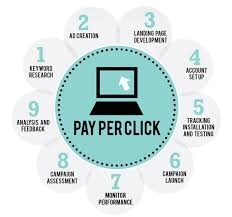When starting a PPC (Pay-Per-Click) campaign for your small business, determining the right budget is crucial to ensure you get the most out of your advertising investment. The ideal budget varies depending on factors like industry competition, target audience, goals, and the platform you’re using for PPC. However, there are some general guidelines to help small businesses create an effective PPC budget that aligns with their marketing goals.
Factors to Consider When Setting a PPC Budget
- Industry Competition: Highly competitive industries, such as law, insurance, and real estate, tend to have higher cost-per-click (CPC) rates. For businesses in competitive industries, you might need to allocate a larger budget to stand out from the competition. For example, businesses in local SEO or niche markets may have lower CPC rates and can work with a more modest budget.
- Goals and Objectives: Are you looking to drive brand awareness, increase website traffic, or generate sales and leads? Your budget should align with your specific goals. If your goal is to drive local traffic through Google Ads or Facebook Ads, you might start with a smaller budget and scale up as you see positive results.
- Target Audience: The size of your target audience influences your budget. If you’re targeting a broad audience, you may need a higher budget to reach more people. Conversely, if you’re targeting a smaller, more specific group, your budget can be lower while still being effective.
- Platform Choice: Different platforms have different cost structures. Google Ads might have higher costs due to intense competition for search queries, while Facebook Ads and Instagram Ads may offer lower-cost options for reaching a highly targeted audience.
- Conversion Rate and CPC: If you’re tracking the conversion rate and CPC (how much you’re paying per click), this data can help you adjust your budget over time. The better your ad copy and landing page optimization, the more efficient your PPC spend will be.

How to Calculate Your PPC Budget
Here’s a simple process to help you decide on your PPC budget:
- Identify Your Target Cost-Per-Click (CPC): Determine how much you’re willing to pay for each click based on your industry and the competitiveness of your keywords. Use Google’s Keyword Planner or other research tools to estimate your CPC.
- Set a Monthly Spend Goal: A common approach for small businesses is to start with a monthly PPC budget and adjust it based on campaign performance. A reasonable starting point could be between £500 to £2,000 per month for small businesses, depending on industry and goals.
- Determine Your Conversion Goals: If your goal is to generate leads or sales, calculate how many conversions you need to make the campaign profitable. For example, if your CPA (Cost Per Acquisition) is £50 and you want 10 conversions, your budget should be £500.
- Monitor and Adjust: PPC campaigns often need adjustments over time. After running the campaign for a few weeks, assess the performance, monitor Google Ads or Facebook Ads metrics, and tweak your budget to maximize ROI.
Example of a PPC Budget Breakdown
Let’s assume you’re running a Google Ads campaign and want to generate leads. You’ve calculated your target CPC is £2, and you aim to generate 100 conversions (leads) per month.
- Cost Per Click (CPC): £2
- Number of Conversions: 100
- Budget Needed: £2 x 100 = £200
In this case, a £200 monthly PPC budget should help you achieve 100 conversions, depending on how well your campaign performs. If your conversion rate is lower, you might need to increase your budget or refine your targeting.
Best Practices for Small Business PPC Budgets
- Start Small and Scale Gradually: If you’re new to PPC advertising, start with a smaller budget and gradually scale up once you see results. This approach minimizes risk while allowing you to experiment with different ads and targeting.
- Focus on Long-Tail Keywords: Long-tail keywords tend to have lower competition and CPCs, making them more budget-friendly for small businesses. Targeting specific search queries can help you reach an audience that’s more likely to convert.
- Use Negative Keywords: Adding negative keywords ensures your ads don’t show up for irrelevant searches, which helps you save money and improve your ROI.
- Track Your Campaign Performance: Regularly monitor your Google Ads or Facebook Ads campaigns. Track metrics like click-through rates (CTR), conversion rates, and cost per conversion to assess the effectiveness of your PPC budget. If something isn’t working, tweak your ads or targeting.
- Optimize Your Landing Pages: To make the most out of your PPC budget, ensure your landing pages are optimized for conversions. A high-converting landing page increases the chances of turning clicks into customers, making your budget more efficient.
Conclusion
The ideal PPC budget for a small business depends on your industry, goals, and the platform you’re using. While there’s no one-size-fits-all answer, a good starting point is between £500 to £2,000 per month. Begin small, track performance, and gradually increase your budget as you optimize and improve the results of your campaigns. To ensure you’re maximizing your ad spend, consider using Google Ads or Facebook Ads, refining your targeting, and improving your landing pages.
At Social Media Max, we can help you create a PPC strategy that aligns with your business goals. Reach out to us today to learn how we can help you optimize your PPC campaigns for success.

